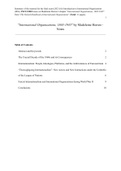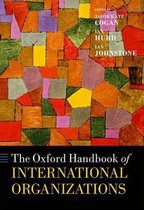Summary of the material for the final exam (2021) for Introduction to International Organisations
(IIOs). INCLUDES notes on Madeleine Herren’s chapter “International Organizations, 1865-1945”
from “The Oxford Handbook of International Organizations” (Total: 11 pages).
1
“International Organizations, 1865-1945” by Madeleine Herren -
Notes
Table of Contents
Abstract and Keywords 2
The Crucial Decade of the 1860s and its Consequences 2
Internationalism: People, Ideologies, Platforms, and the Ambivalences of Eurocentrism 4
“Thoroughgoing Internationalism”: New Actors and New Interactions under the Umbrella
of the League of Nations 6
Fascist Internationalism and International Organizations during World War II 9
Conclusions 10
, 2
Abstract and Keywords
Takes off from the period of the 1860s when International Organisations (IOs) began to shape access
to the world market and the formation of transnational movements.
Internationalism was developed in the 19th century and served as an umbrella term, linking different
transnational movements. IOs started to play an important role in international civil society, within the
new-interconnecting world.
After World War I (WWI), the function and importance of IOs changed dramatically.
Timeline:
● In 1814/1815 IOs first developed from the establishment of the new political order of Europe
(following the Napoleonic Wars at the Congress of Vienna, which started several multilateral
security conferences for diplomatic consultation and the introduction of an interstate system).
● Several bodies were established later to highlight interstate cooperation and regulation,
focusing on economic and public health matters.
➔ Central Commission for the Navigation of the Rhine (1815)
➔ European Commission for the Control of the Danube (1856)
➔ The sanitary councils of Alexandria (1831), Constantinople (1838), and Tangier
(1840).
● Early transnational movements also started to develop (e.g. the anti-slavery movement, early
pacifist organizations, women’s rights, and transnational workers’ alliances).
● Between 1960-1965, IOs started to take off, reaching the status of agencies that propelled the
processes of nation-building.
➔ Interconnectedness became a government tool of power for nation-states, groups and
individuals in semi- or non-governmental functions.
➔ All this, opened new dimensions for communication, interaction and (direct/indirect)
negotiation and exchange.
● Today, IOs’ string platform of exchange, as well as their range and density heavily influence
the interactions between territorially based state powers and other actors, gaining access to
global flows of information and international meeting points.
Global bodies are shaped by:
1. The global environment of international gatherings (considers a developing international civil
society).
2. The people and concepts related to global expertise (include the processes of
professionalization of international expert groups).
3. The division between states’ foreign policy-driven international relations (IRs) and the
involvement of the international civil society (interferences between global governance and
foreign policies in a period).
The Crucial Decade of the 1860s and its Consequences
IOs founded in the 1860s:
● The International Committee of the Red Cross (ICRC) in 1863.
, 3
➔ Started as a private initiative, but attained international recognition by the Geneva
Convention (1864), as a multilateral treaty.
● The Telegraphic Union in 1865, later renamed the International Union of Telecommunications
(IUT) in 1934.
➔ Was a public international union (institutions based on multilateral treaties and
devoted to technical standardization and the border-crossing transfer of information).
International bodies active in the 1860s distinguished themselves with a mixture of governmental
activities and initiatives that supported an active international civil society.
The existence of an international body does not always specify its political relevance.
➔ E.g. the Latin Monetary Union, a multilateral treaty, signed in 1865, fixed free circulation and
convertibility of coins among the treaty powers. It gave the French government the
responsibility to organize regular conferences of this currency union without ever establishing
an international secretariat.
International bodies also dominated ongoing colonial expansion questioning whether territorial power
could be shared internationally.
➔ It resulted in extraterritorial arrangements and made it possible for states not belonging to the
Eurocentric exclusive club to participate in imperialism projects and share political power.
➔ The option of founding an IOs was the only acceptable form of governance in cases of
controversial colonial claims.
These IOs became more significant to accepted sovereign states that were targeted by Western
imperialism (e.g. the Ottoman Empire and China).
➔ Concessions and capitulations granted privileges to Western foreigners in jurisdictional,
economic, and taxation matters.
➔ These regimes allowed for further multinational treaties and international bodies.
◆ E.g. the Ottoman sultan signed international treaties which established an
international committee for the reorganization of Lebanon in 1861 among others.
International governance in the form of multinational treaties, international commissions, and
committees grew from the mid to late 19th century onwards. Such international agreements
guaranteed access to:
● Rivers (e.g. Rhine, Danube, Congo).
● Territories (e.g. Congo, 1885).
● Ports.
International committees:
● Temporarily controlled the national debts of:
○ Egypt (1880)
○ Greece (1897)
○ Macedonia (1906)
○ The Ottoman Empire (1878)
● Established extraterritorial zones (e.g. the international settlement in Shanghai, 1843).






